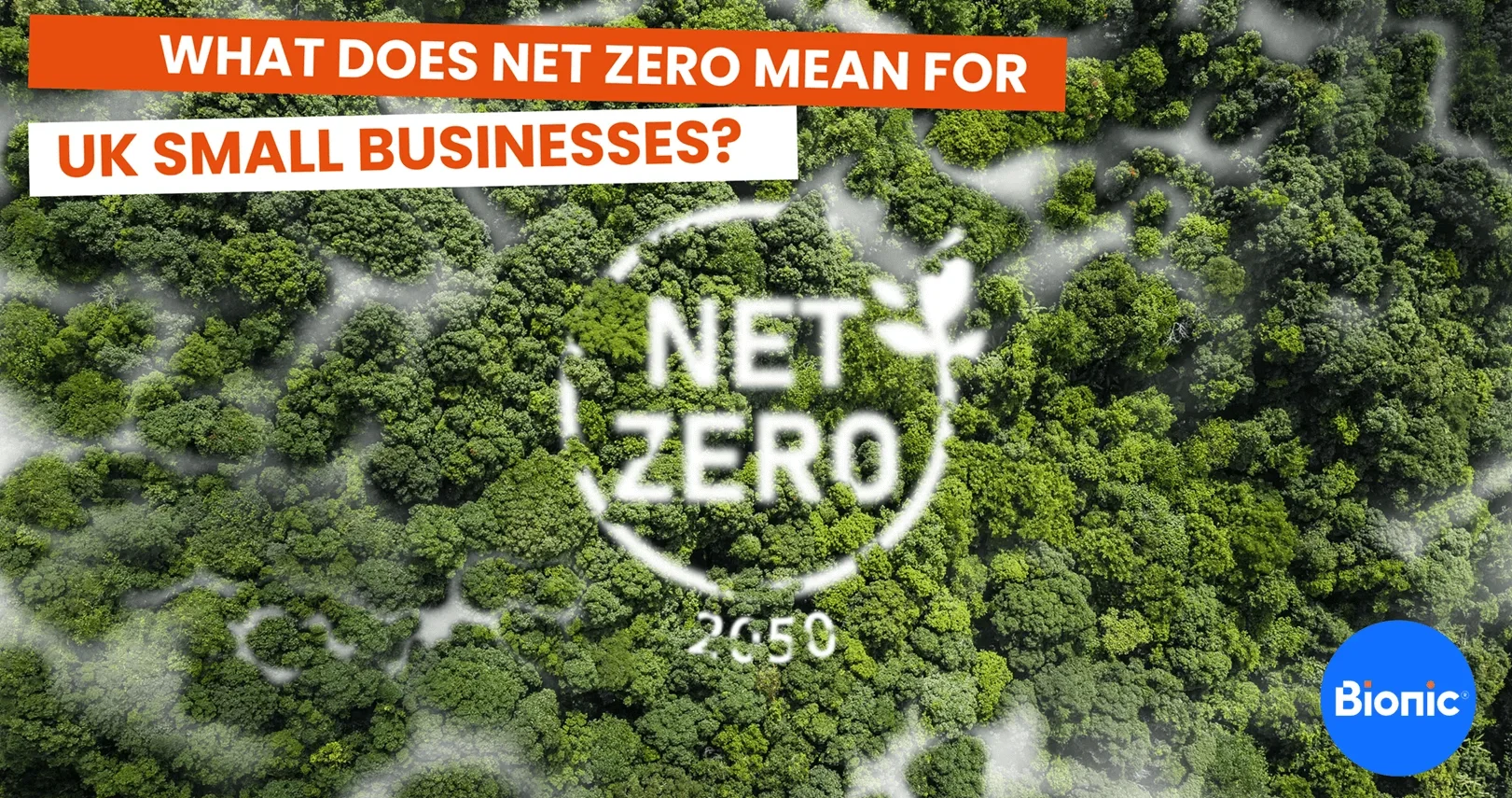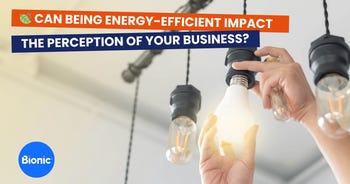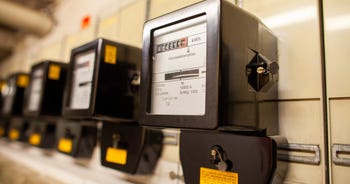What is net zero, and how do we achieve it? A comprehensive guide for small businesses
Net zero for UK small businesses means reducing your greenhouse gas emissions as far as possible and then balancing any remaining emissions. In theory, this should mean your business adds no extra carbon to the atmosphere.
But, as a small business owner, you’ve always got a million and one things on your mind - and net-zero targets are probably way down your list of priorities (if they're even on there at all). But cutting your carbon footprint doesn't have to interfere with the day-to-day running of your business.
Net zero isn’t about becoming perfect overnight – it’s about understanding where your emissions come from, taking practical steps to cut them, and setting a realistic plan to reach (or get close to) zero by 2050 or sooner.
This Bionic guide covers everything you need to know about helping your business to make a positive impact (without all the confusing jargon), from energy-efficient practices to sustainable supply chains, and much more.

Five-point summary on net zero and UK small businesses
- Being ‘net zero’ is about removing the carbon dioxide (C02) we emit into the atmosphere to stop the build-up of greenhouse gases that cause the 'greenhouse gas effect'. Most businesses emit some carbon dioxide, but small steps can be taken to reduce the amount.
- Net zero is part of the Paris Agreement signed by 196 world leaders. It's important we work together to achieve net zero, which means stopping global warming from reaching +2°C.
- We can achieve net zero by removing carbon from the atmosphere, improving energy efficiency in buildings, decarbonising power sources and using electric-driven transport.
- Businesses can help by reducing waste, recycling and composting and becoming more energy efficient in their general business practices.
- We're moving to a greener way of living - more companies are becoming sustainable, customers are becoming more ethical, and investors are looking for sustainable businesses.
- Bionic can help advise on greener business practices as well as green energy tariffs for your business.
What does it mean to be net zero?
Net zero means aiming to remove as much emitted CO2 as possible to stop the build-up of greenhouse gases in the atmosphere.
Greenhouse gases are gases that trap heat in the Earth's atmosphere, leading to the greenhouse effect and influencing the planet's climate. These gases can absorb and re-emit infrared radiation emitted by the Earth's surface. As a result, they act like a blanket, trapping heat and preventing it from escaping into space.
Carbon dioxide (CO2) is the most significant greenhouse gas in terms of its contribution to global warming. It’s released through various human activities such as burning fossil fuels — like coal, oil and natural gas — as well as things like deforestation and industrial processes.
What does net zero mean for UK small businesses?
Whether it’s through a business's premises, the vehicles they use or even their supply chain, even the smallest of companies produce carbon emissions.
Your business reaches net zero when the greenhouse gases you add to the atmosphere each year are balanced by the amount you remove or offset, so the net impact is zero.
This usually starts with cutting emissions from your own operations (Scope 1), the energy you buy (Scope 2) and, over time, key parts of your supply chain and travel (Scope 3).
The UK government's stance is that taking action on climate change can help businesses grow, encourage investment and adapt to the ever-changing planet.
What are Scope 1, 2, and 3 emissions?
The GHG Protocol Corporate Standard splits a company’s greenhouse gas emissions into three scopes – scope 1, scope 2 and scope 3 – but this framework applies to a company's carbon footprint, not a specific product's carbon footprint.
Scope refers to what emissions are counted and what emissions aren't. The idea is to separate direct and indirect emissions and avoid two companies counting the same emissions in the same scope. Here's a quick breakdown of each scope:
Scope 1 – direct emissions
Scope 1 covers emissions from sources your business owns or controls – things like gas boilers, on‑site generators, industrial processes, refrigerants and fuel used in your own vehicles and plant.
Scope 2 – purchased energy
Scope 2 covers indirect emissions from the electricity, steam, heat or cooling your business buys in. If you burn fuel on‑site to make your own power, that sits in scope 1 instead. Scope 2 is only about the emissions from generating the energy you purchase, not the full upstream fuel or grid losses.
Scope 3 – value chain emissions
Scope 3 is everything else in your value chain that you don’t own or control but still influence – from purchased goods and business travel to how products are used and disposed of. It’s split into upstream and downstream activities across 15 categories and is often the biggest slice of a company’s overall footprint.
Why is net zero important for businesses?
Achieving net-zero emissions is crucial in helping businesses navigate climate change. By reducing greenhouse gases and balancing any remaining emissions through removal or offsetting, businesses can help limit global warming to well below 2°C. This was the key objective outlined in the Paris Agreement.
The Paris Agreement is an international treaty adopted by 196 parties at the UN Climate Change Conference that was agreed in November 2016 in an effort to take on climate change.
How do you achieve net zero?
Achieving net zero is a big job and an ongoing process; however, there are several ways businesses can help:
- Removal of carbon from the atmosphere — To reach net zero, businesses can actively help to remove CO2 from the atmosphere. This can include investing in nature-based solutions such as afforestation — planting new forests — and reforestation — restoring existing forests. Additionally, carbon capture and storage (CCS) technologies can be used to capture CO2 emissions from industrial processes and store them underground.
- Improve energy efficiency in buildings — Buildings are big contributors to greenhouse gas emissions. To help reduce their carbon footprint, businesses can aim to improve energy efficiency within their facilities, including office spaces and warehouses. This can include everything from improving insulation, installing energy-efficient lighting and conducting an energy audit.
- Decarbonisation of power — Transitioning to low-carbon or renewable energy sources is an important step towards being net zero. Businesses can start using electricity from renewable sources like solar power, wind, hydro and geothermal. This can be achieved through on-site generation or power purchase agreements (PPAs) with renewable energy providers.
- Electrification of transport — The transportation sector is a significant contributor to greenhouse gas emissions. Businesses can work towards net zero by electrifying their vehicles. This includes transitioning from fossil fuel-powered vehicles to electric vehicles (EVs) and installing charging infrastructure. Encouraging employees to use public transport, promoting car sharing where possible, and supporting other options like cycling and walking can also help to reduce emissions from commuting.
In the quest for sustainability, businesses play a vital role in making significant strides toward achieving net zero.
What has the UK pledged to do to reach net zero?
To help reach net zero by 2050, the UK has set out several policies and proposals that include:
- Banning the sale of new petrol and diesel cars from 2030, with the aim of making the switch to electric vehicles.
- Installing 600,000 heat pumps a year in order to replace gas boilers by 2028. Find out more about commercial heat pumps for your business with our guide.
- Generate all electricity from clean sources, such as wind and solar, by 2035.
- Using carbon capture to remove between 20 and 30 million tonnes of CO2 per year by 2030.
According to the Climate Change Committee’s 2025 Progress Report to Parliament, UK emissions dropped by just over 50% from 1990 to 2024. This makes the UK the first major economy to halve its emissions and comes on the back of ten straight years of cuts driven mainly by cleaner power and the closure of the last coal station.
But as more people travel by plane and electricity gets cleaner, most future reductions to 2030 must come from electrifying transport, heating and industry, backed by a bigger, low‑carbon grid.
Beyond 2030, those sectors still have to go further, while aviation, farming, land use and engineered carbon removals all need to ramp up to keep the UK on track for its carbon budgets.
Can we be net zero by 2050?
While the goal of achieving net-zero emissions by 2050 is ambitious, it is considered feasible with significant efforts and investments across different sectors. The UK's progress towards this target will depend on continued commitment, policy support, technological advancements, and collaboration with businesses, communities, and international partners.
How can my business move to net zero?
No matter how big or small your business may be, there are some quick and easy steps you can put in place to help your business move toward becoming net zero. A good approach is to follow a simple cycle: measure your emissions, make a plan, take action, then review progress and repeat.
Basic steps
- Reduce waste - Implement strategies to minimise waste generation within your business operations. This can include measures like optimising production processes, reducing packaging, and encouraging responsible consumption. If there’s less going to landfills, this benefits the environment.
- Recycle and compost - Establish a robust recycling and composting program within your workplace. Ensure that employees are educated about proper recycling and waste disposal practices. By recycling plastic, paper, cardboard and other materials, businesses are helping to lessen the impact on the environment.
- Improve energy efficiency - Improve energy efficiency in your facilities by installing energy-efficient lighting, upgrading equipment, and implementing smart energy management systems. This will help reduce your energy consumption and lower carbon emissions.
- Switch to renewable electricity - Consider moving to a green or renewable business electricity tariff to cut the carbon footprint of the energy you already use.
- Rethink travel and transport - Reduce business mileage where possible, encourage public transport, car‑sharing, cycling or walking, and start planning for electric vehicles if you run a fleet.
Advanced options
- Greener supply chain - Work with your suppliers to make your supply chain more sustainable. Encourage them to adopt environmentally friendly practices and prioritise suppliers that share your commitment to sustainability. You can look into buying products that take less energy to make, transport and use as a starting point.
- Cut down on packaging - Explore ways to reduce packaging materials and choose eco-friendly alternatives. Consider using biodegradable or compostable materials and design packaging that minimises waste and maximises recyclability!
- Renewable energy options - Transition to renewable energy sources for your business's electricity needs. Installing solar panels or exploring purchasing renewable energy credits can help to offset your energy consumption.
- Carbon offsetting - Consider investing in carbon offset projects to compensate for any remaining emissions that your business cannot eliminate. Support projects such as reforestation, renewable energy initiatives, or methane capture projects to offset your business's carbon emissions.
- Adopt recognised standards and certifications - Where appropriate, you can work towards frameworks such as the SME Voluntary Emissions Standard, ISO 14001 or B Corp certification to structure and evidence your net zero journey.
- Use data and digital tools - Smart meters, energy dashboards and basic carbon calculators can help you track progress and identify which actions are cutting the most emissions for your business.
How are times changing?
These days, there are so many reasons why it’s so important for companies to work toward becoming net zero. Not only are consumer views switching, but the rules and regulations surrounding the environment are changing.
Employees are actively seeking out more sustainable companies
Employees, especially younger generations, are increasingly prioritising sustainability and environmental responsibility in their career choices. They are actively seeking out companies that demonstrate a commitment to addressing climate change and reducing their carbon footprint. This shift in employee expectations is influencing businesses to adopt more sustainable practices to attract and retain top talent.
But that’s not to say it doesn’t come without its criticism. Businesses that openly raise awareness about climate change and move toward a net zero future are often met with even harsher criticism to ensure all processes in place are legitimate.
Customers are turning toward more ethical brands
Consumers are becoming more environmentally conscious and are gravitating towards brands that align with their values. They’re increasingly seeking out ethical and sustainable products and services, and businesses that actively address climate change and promote sustainable practices are more likely to attract and retain customers who prioritise environmental responsibility.
Investors are looking for more sustainable business models
Investors are recognising the financial risks associated with climate change and are incorporating environmental considerations into their investment decisions. They’re increasingly seeking out companies with sustainable business models and climate resilience.
Businesses that demonstrate a commitment to net-zero emissions, energy efficiency, and sustainable practices are more likely to attract investment and secure funding.
If you’re looking to find the right investor for your business, take a look at our handy guide.
Get your business set with Bionic
No matter the size of your business, helping to contribute toward becoming net zero is one of the biggest impacts it can make. Whether it’s reducing the packing in your supply chain or implementing a greener transport link for your employees, even the smallest of changes can make a big difference.
If you need more help understanding business energy, head over to our energy guide pages for more information. Or, get in touch today with the Bionic team to discuss your business energy needs to compare business electricity and gas.
FAQs on net zero and your small business
Here’s an at-a-glance guide to some of the most frequently asked questions about net zero and UK small businesses:
What does net zero mean for a small business in the UK?
Net zero means your UK small business cuts its greenhouse gas emissions as much as possible and balances any remaining emissions so you do not add extra carbon overall.
Do UK small businesses legally have to be net zero by 2050?
The 2050 net zero target applies at the national level, but many UK small businesses now face growing pressure from customers, lenders and supply chains to align with it.
How does a UK SME start working towards net zero?
Most UK SMEs start by measuring their energy and fuel use, identifying quick efficiency wins, and then setting simple emission‑reduction targets.
What are the cheapest net-zero actions for UK small businesses?
Adjusting heating and cooling, switching to LEDs, cutting waste and reducing travel are usually the cheapest first steps for UK small businesses.
Do UK small businesses need to report all Scope 3 emissions to go net zero?
Smaller businesses typically begin with Scopes 1 and 2 plus a few key Scope 3 areas, then expand coverage as data and resources improve.
Can switching to green business energy help my small UK business reach net zero?
Yes, choosing a credible green or renewable energy tariff reduces the carbon footprint of your electricity and supports the wider UK net zero transition.
Are there UK grants to help small businesses cut emissions?
Some UK grants, loans and tax incentives can help SMEs fund efficiency upgrades and low‑carbon tech, but availability varies by region and over time.
How can Bionic help my UK small business on its net zero journey?
Bionic compares business energy tariffs, including greener options, and offers guides and support so you can align your energy choices with your net-zero plans.








